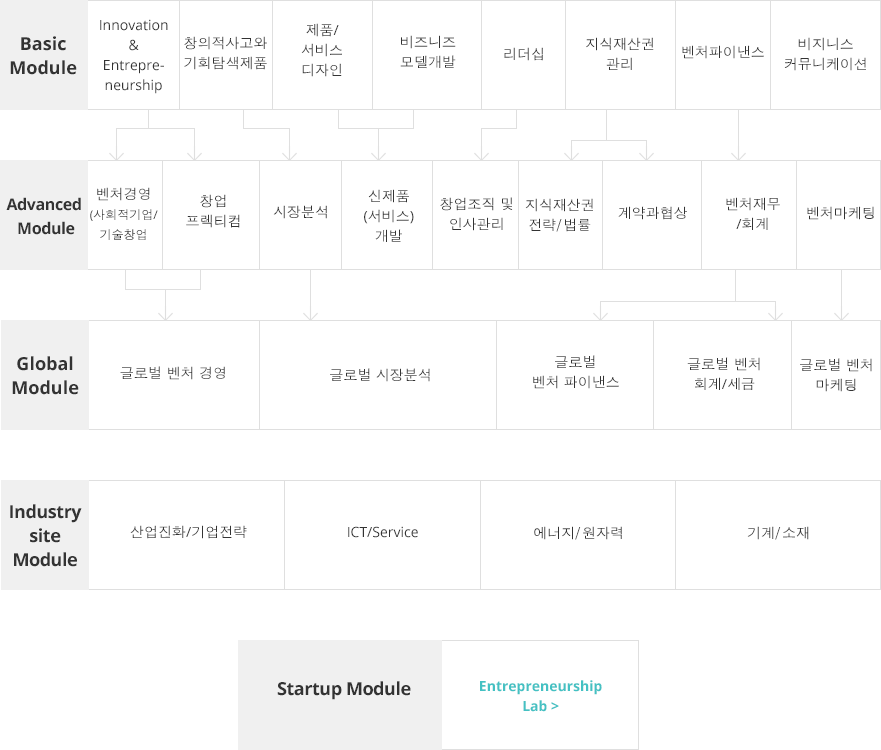E & I (Entrepreneurship and Innovation) 프로그램은 UNIST의 특화된 융합교육에 기업가 정신을 접목하여 미래 사회를 이끌어갈 창조적인 인재를 양성하기 위해 설립되었습니다.
창업융합과정은 공학적 전문지식과 창의적 기업가정신을 겸비한 글로벌 창업융합 인재 양성을 목표로 합니다.
이를 위하여 일반대학원 이공계열 및 전문대학원의 교육과정과 창업융합전문석사과정의 기업가정신, 창업 관련 이론/실습 교육과정 등을 이수하며 실습을 통한 문제해결 중심형 교육과정으로 구성되어 있습니다.
- 창업에 필요한 지식소요를 모듈로 구성하고 이에 기반한 커리큘럼 교육
- 단기간에 완성하는 1년 과정
- 학생주도 해외 컨설팅 프로젝트 참여기회 제공
- 창업인턴쉽과 연계한 모의창업 프로그램 운영
- 해외창업교육프로그램 참가비 지원
- 졸업 후 각종 창업지원사업 지원 시 가산점 부여

-
EPS 501Entrepreneurial Mindset
This course focuses on how firms (both new and old) can create and capture value from product, process, and service technological innovations. To do so, this course will introduce students to new frameworks for examining both new and old problems related to innovation and technological change. This course consists of a mix between case studies and project courses, with an emphasis on class discussion and debate. While most of the case studies in class will focus on technology-oriented contexts, many of the insights developed during this course will be highly applicable to firms in non high-tech industries as well. A mastery of the tools and frameworks developed in this course will be useful to entrepreneurs responsible for the introduction and implementation of new products or services.
-
EPS 502Operating Startups
This course provides insight into the key steps needed to build a successful startup by designing a roadmap for developing and maintaining product and services, in a capital-efficient way and for maximum impact. The main idea in this course is learning how to rapidly develop and test ideas by gathering massive amounts of customer and marketplace feedback. Students will learn how to get out of the building and search for the real pain points and unmet needs of customers and how to find a proper solution and establish a suitable business model. Building a startup is not simply building an execution plan for a business model that the entrepreneur thinks will work, but rather, a search for the actual business model itself.
-
EPS 511Venture Financing
This course provides insight into the key steps needed to build a successful startup by designing a roadmap for developing and maintaining product and services, in a capital-efficient way and for maximum impact. The main idea in this course is learning how to rapidly develop and test ideas by gathering massive amounts of customer and marketplace feedback. Students will learn how to get out of the building and search for the real pain points and unmet needs of customers and how to find a proper solution and establish a suitable business model. Building a startup is not simply building an execution plan for a business model that the entrepreneur thinks will work, but rather, a search for the actual business model itself.
-
EPS 512Entrepreneurial Marketing
How do you effectively perform the marketing function as an entrepreneur with limited time, financial resources, and people? This course focuses on key entrepreneurial marketing concepts and methods and their real world application by entrepreneurs. This course begins with students picking an entrepreneurial venture for which to develop an operational marketing plan. The venture is preferably one that the students would consider actually implementing if the plan proves feasible. The course sessions will typically cover an aspect of marketing for an entrepreneurial venture. The venture could also be a company for whom you are currently working. In addition to clarifying the concepts and methodologies in the readings, the course sessions will attempt to apply the concepts to the ventures of the students.
-
EPS 513Law and IP for Entrepreneur
This course focuses on the protection of proprietary rights in inventions, writings, creative expression, software, trade secrets, trade designations, and other intangible intellectual products by federal patent, copyright, trademark and unfair competition law, and by state trade secrecy and unfair competition law. Consideration will be given to the challenges posed for traditional intellectual property paradigms by new technologies and the shift to an information-based economy. This course is designed for the legal issues for startups.
-
EPS 514Global Entrepreneurship
This course addresses various aspects of global entrepreneurship and the opportunities available to start-ups and small businesses in the global environment. It explores the opportunities that entrepreneurs create, the challenges they encounter, and the ways in which they exploit opportunities and address challenges to conduct business across national boundaries and cultures. This course also examines entrepreneurship across different countries and cultures and the role of cross-cultural customs and institutional networks in affecting global and immigrant entrepreneurship. As developing and growing entrepreneurial and innovative businesses is very different to managing large established businesses in an international or global context, this course explores the special problems and advantages associated with entrepreneurial small and medium enterprises as well as re-interpreting the skills students have acquired into a global context.
-
EPS 515Growth Strategies
This course focuses on the problems that new venture companies face during their growth stages. Topics will cover company life cycle, growth theories, growth strategy, the role of management, organizational structure, business model innovation, franchise growth strategy, and marketing and finance strategy for growth.
-
EPS 590Entrepreneurial Practice I
Entrepreneurial Practice I is similar to research credits but applied to students individual entrepreneurial activities every semester. Those activities include problem identification, customer and technology validation, business formulation and development, influence of the regulatory environment, product development, validating the business model, operational planning, launching the entrepreneurial venture, etc.
-
EPS 591Entrepreneurial Practice II
Entrepreneurial Practice II is similar to research credits but applied to students individual entrepreneurial activities every semester. Those activities include problem identification, customer and technology validation, business formulation and development, influence of the regulatory environment, product development, validating the business model, operational planning, launching the entrepreneurial venture, etc.
-
EPS 599Capstone Project
This is a project course to solve the real-life problems of startup businesses. Students will apply the frameworks and tools of entrepreneurship and innovation management, and plan problem-solving through on-site problem identification, problem analysis, site visiting, and identification of solutions. After the completion of the project, students must turn in a written report.


